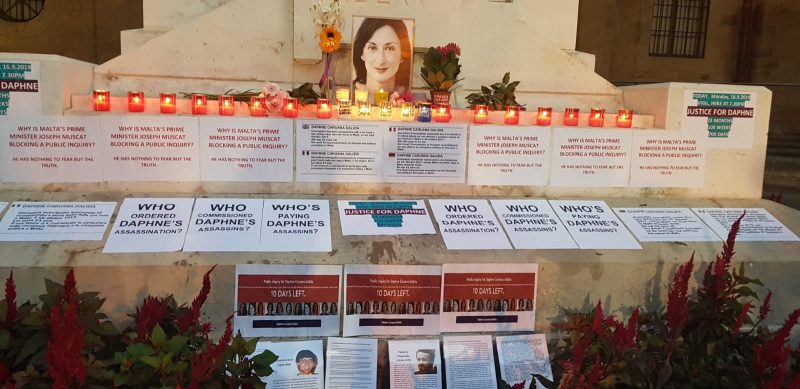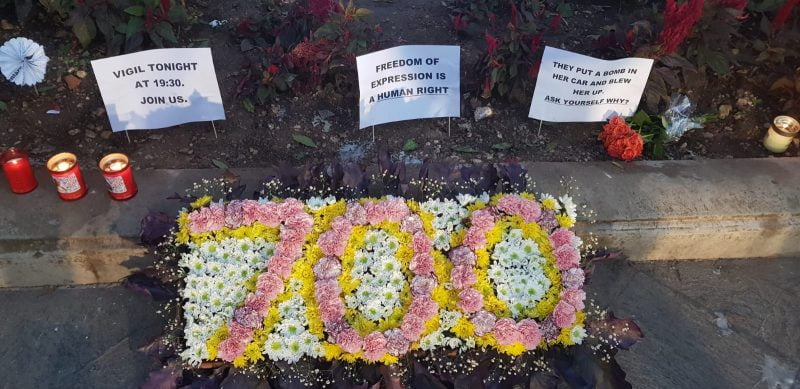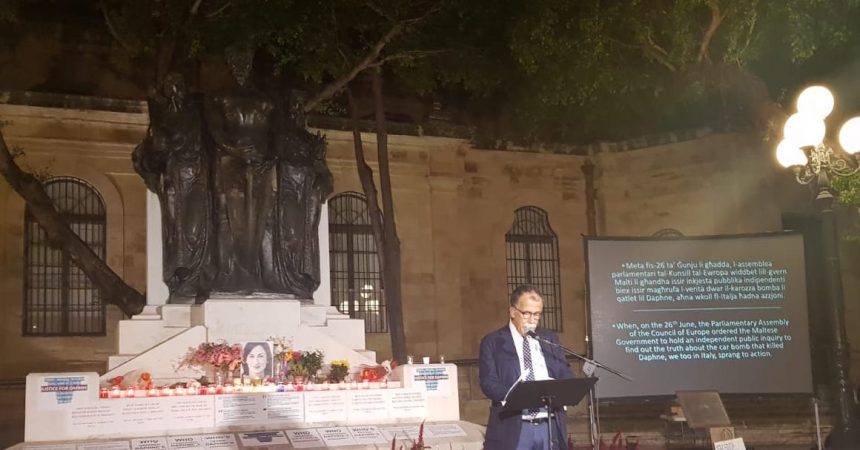Renowned Italian journalist Sandro Ruotolo has condemned the Maltese government for failing to help Daphne Caruana Galizia. “One of the aspects of Daphne Caruana Galizia’s murder that I cannot tolerate,” he said, “is that she had received threats and she feared for her life. And she had asked the State to help her, in vain.”
Ruotolo was speaking at a vigil in Valletta that marked 23 months since the journalist’s was killed with a massive car bomb on the road outside her home.
With just ten days to go until the deadline set by the Council of Europe for the Maltese government to open a public inquiry into the brutal murder, Ruotolo called for justice and answers. “When a journalist dies,” he said, “a whole chunk of democracy dies.”
“If you are less free, we too are less free” because a threat or attack against one journalist has an effect on all journalists. Ruotolo also referred to the public’s belief that Caruana Galizia’s investigations had taken her right to the “centres of power”, and stressed that the public needs to know who masterminded her murder.

Messages were also read out at the event on behalf of Giovanni Impastato and Paolo Siani, the brothers of murdered Italian journalists Peppino Impastato and Giancarlo Siani.
Impastato wrote of the similarities between his brother Peppino and Daphne, noting that they were both physically “torn to pieces” because that is what “oppressive powers” do when they want to target those who write about the “corruption of politicians” and the “interweaving of politics and crime”.
“They wanted to shut them up,” he said, “to suffocate their voices, as they did to so many others who suffered the same fate.”
Paolo Siani added that “when a journalist is killed in this way, with a car bomb, the only way it can happen is because of their work, because of what they knew, and because of what they were investigating or writing. But especially because of what they had not written yet, but knew.”
“This should be the starting point of all inquiries,” he said, “even if they are complex and difficult.” Siani expressed his solidarity with the Caruana Galizia family and the wish to build a new society “free from Mafias”.
Messages of support poured in from around the world, calling for the Maltese government to act.
16 September. 23 months / 100 weeks of impunity since #DaphneCaruanaGalizia‘s assassination. 10 days left to launch an independent public inquiry. @occupyjusticema #WhoKilledDaphne #JusticeforDaphne #Malta https://t.co/lhBHY2MaxX
— European Centre for Press and Media Freedom (@ECPMF) September 16, 2019
The European Centre For Press and Media Freedom referred to “100 weeks of impunity” since Caruana Galizia’s assassination, and reminded the government it had 10 days left to start an independent public inquiry.
Reporters Without Borders also called for a public inquiry, saying there has been no justice for this “heinous crime”.
Today marks 23 months since journalist #DaphneCaruanaGalizia was heinously killed by a car bomb in #Malta & still there’s been no justice. We call again for an independent public inquiry into her assassination – just 10 days left until the @coe’s deadline. https://t.co/WbYFh9HqfW
— RSF in English (@RSF_en) September 16, 2019
PN Head of Delegation Roberta Metsola pointed out that the masterminds are still at large and “the crooked and corrupt remain protected”. PN MEP David Casa added that when journalist Jan Kuciak was assassinated in Slovakia, “200+ people were interrogated, eight arrested, four charged, one extradited, mastermind identified, Prime Minister and his Cabinet resigned.” This took place within 200 days of Kuciak’s killing. But in the 700 days since Caruana Galizia’s murder, it has become obvious that the Maltese government “could not care less”.
The organizers of the vigil, civil society group Occupy Justice, asked, “What’s the hold up?”, pointing out that it has been 100 weeks since Joseph Muscat declared “no stone will be left unturned” in the investigation.
#MemorialWatch #100weeks
Only *10 DAYS* LEFT for #publicinquiry, @JosephMuscat_JM. It has been 100 weeks since you declared that "no stone will be left unturned" to discover who wanted #DaphneCaruanaGalizia dead. What's the hold up? Someone breathing down your brass neck? pic.twitter.com/bdORFIbWbz— #occupyjustice 🍃 (@occupyjusticema) September 16, 2019
Other speakers at the vigil echoed the call for justice, including the NGO Repubblika’s President Marion Pace Asciak and Secretary General Robert Aquilina. They were joined by British author Lizzie Eldridge, who thanked the strong women involved in the call for justice, including those who have been attacked and harassed as a result.

At a hearing in June, the Parliamentary Assembly of the Council of Europe (PACE) gave the Maltese government three months to launch an independent public inquiry into whether Caruana Galizia’s death could have been prevented, and assess measures in place to ensure such an attack could never happen again.
When questioned about this deadline at the Defend Media Freedom conference in London later that month, Foreign Minister Carmelo Abela confirmed that the government “will abide by the timing that the Council of Europe dictated.” Prime Minister Joseph Muscat and Justice Minister Owen Bonnici later denied the commitment, saying Abela’s words had been misinterpreted by the media.
Malta is facing renewed pressure from the British Foreign Affairs Committee, which published a report saying that Caruana Galizia’s death “should set a precedent for accountability and not, as it currently does, for impunity”.
The committee has called on the UK Foreign and Commonwealth office to apply public pressure for an independent judicial inquiry into Daphne Caruana Galizia’s assassination, rather than using their preferred method of “a firm word behind closed doors”.
With just ten days left until the Council of Europe’s deadline, there is no indication that an inquiry will be held.













